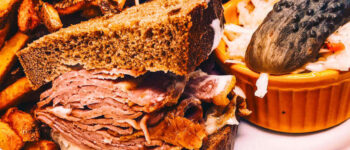As an Italian- I was born knowing How Long to Boil Spaghetti (pasta)- Perfect Every Time. In this very detailed post you will find ALL YOU NEED to know to boil pasta like a pro (plus MORE)!
After extensive research and my own experience and knowledge- here are the most commonly asked questions and precise directions for cooking perfectly cooked pasta (like a true Italian). After learning these tips this is the only way you will cook pasta! It makes all the difference.
This method is for dried store-bought pasta. If you desire to make your own Authentic Homemade Pappardelle Pasta Recipe or Homemade Ravioli- Italian Recipe the cooking methods for fresh pasta are found in these recipe posts.
You may also like this article- Cheap vs. Expensive Pasta (Why Pasta Quality Matters!)
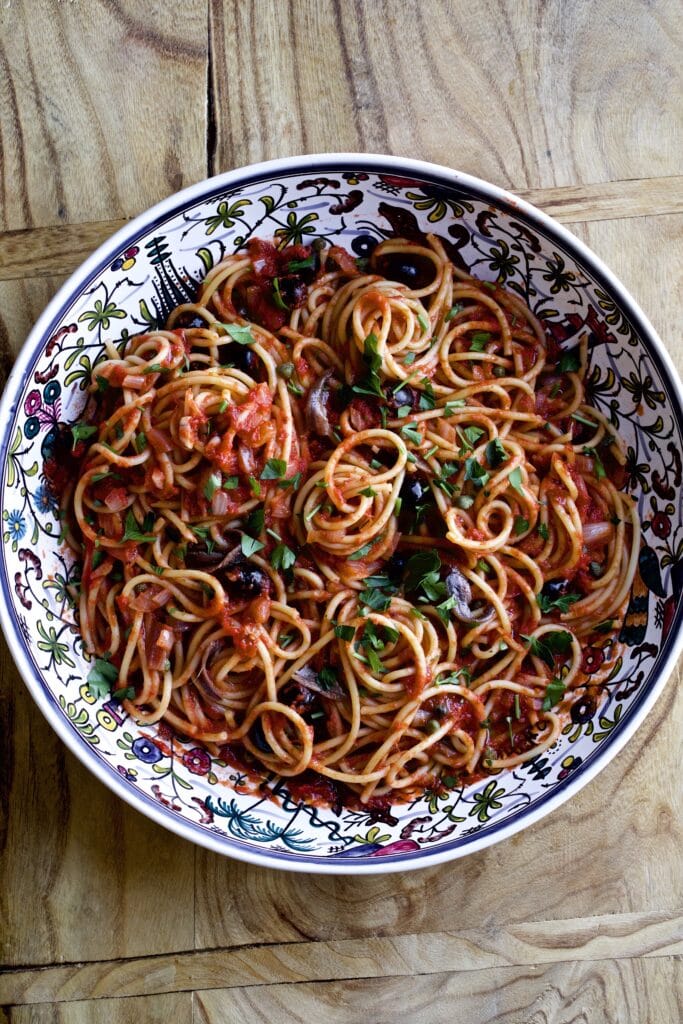
Pictured is my Authentic Italian Pasta Puttanesca Sauce is amazing with perfectly cooked Spaghetti or bucatini. Read this post to know what side dishes best pair with spaghetti recipes.
Jump to:
- How do you boil Spaghetti?
- How to boil Spaghetti- a photo guide
- How do you cook Spaghetti without it sticking?
- Equipment
- Do you need to put oil in pasta water?
- How long should you boil pasta?
- How long do you cook Spaghetti?
- Cooking Pasta ‘al dente’
- Why taste testing pasta matters
- What stove setting for pasta?
- How much water do you use to boil Spaghetti?
- Why you should save your pasta water
- How much Spaghetti should I cook per person?
- Should you rinse pasta?
- Should you rinse pasta for cold pasta salad?
- How to properly salt your pasta water
- When to salt pasta water?
- Do you cover pasta while boiling?
- FAQ and Summary
How do you boil Spaghetti?
Here is a quick step-by-step process of the best practices for cooking pasta. See headings for details and explanations of each step.
The best method for cooking spaghetti pasta:
- Start with a large pot of COLD water. Hot water from the tap often contains added minerals that can damage pots and alter taste.
- Use a large pot (this is the one I use) to boil water and cook pasta. This allows movement for the long pasta (still a good rule of thumb for short pasta).
- Make sure you have plenty of water in the pot. Why? Your pasta needs a place a to move around and swim while cooking.
- Salt your pasta water generously! This is an Italian MUST to flavor the pasta from the inside out. You want the pasta to taste the plain pasta and tell that it is seasoned even before adding any sauce to it.
- Bring the water to a full boil, or rolling boil, before adding the Spaghetti or pasta.
- Stir occasionally with the proper utensil to keep the pasta from sticking. Don’t just dump and run :).
- when stirring spaghetti use a back and forth motion in the pot until the pasta gets soft and starts to move freely in the water (see photos below)
- Test the pasta two minutes before it’s “al dente”.
- Save a scoop of pasta water. Another Italian secret!
- Drain, toss with sauce, and serve hot!
(This same method applies to short pasta varieties- you may use a smaller pot)
How to boil Spaghetti- a photo guide
Waiting until the water boils to add the salt and the pasta. More details on why this is important are in the: “When to salt your pasta water” section of this post.
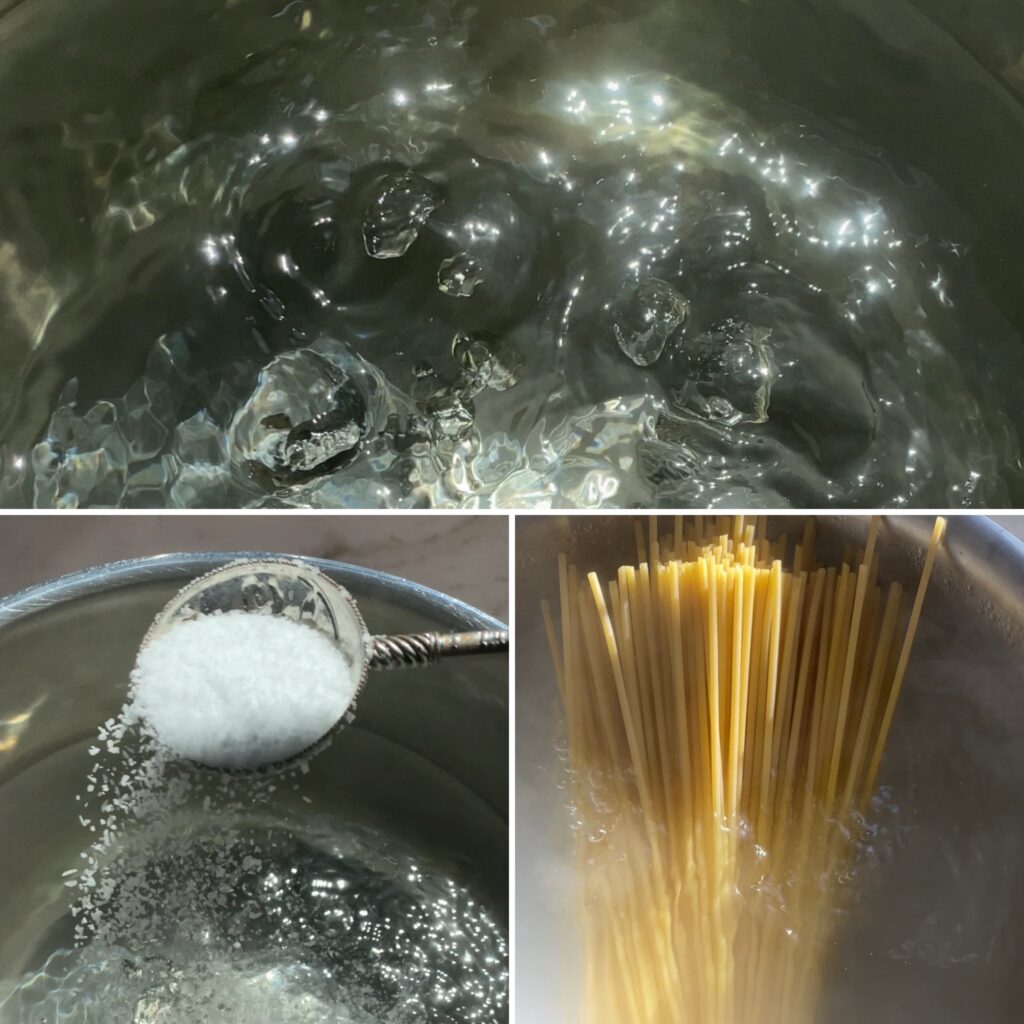
Stir Spaghetti back and forth until the pasta gets soft enough to move in the water by itself.
Read more on why using a large pot and the right amount of water matters in the “How much water do you use to boil spaghetti” section.
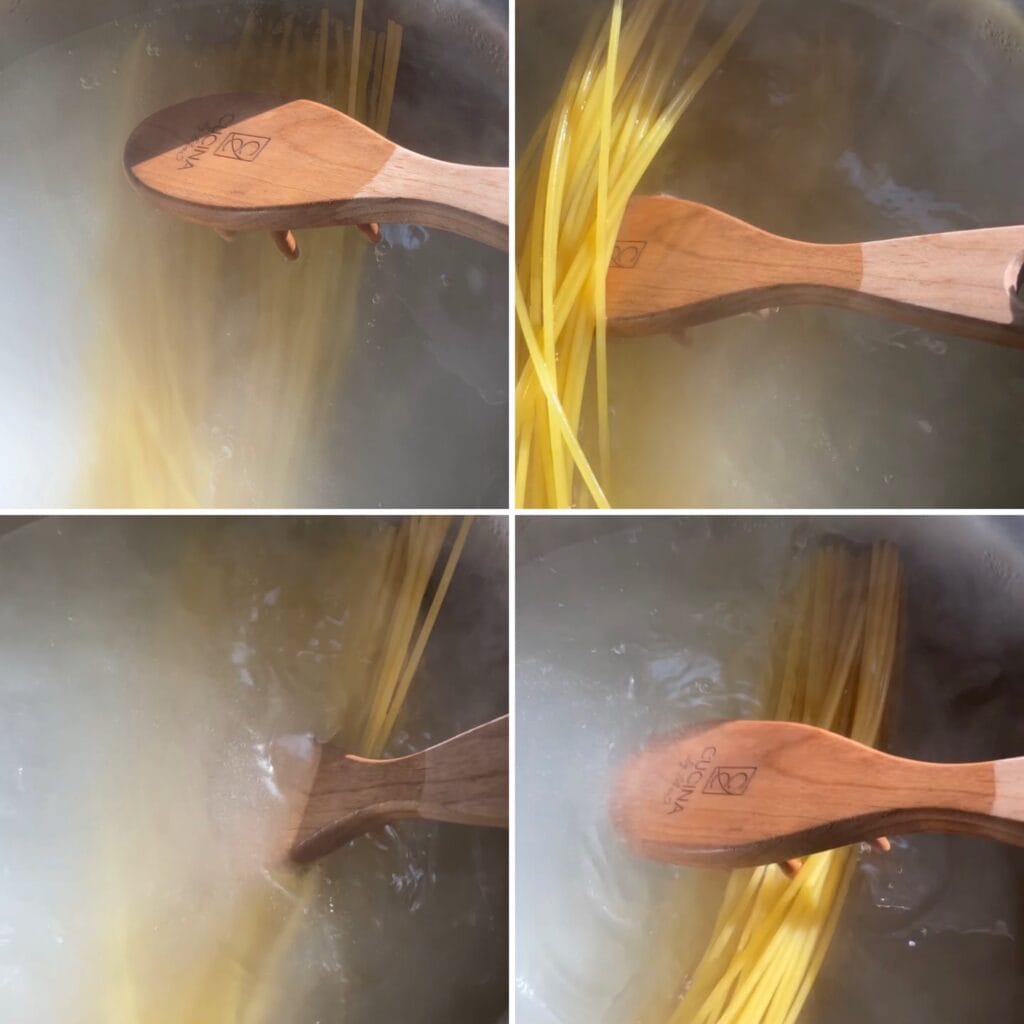
Stir Spaghetti often and test pasta before draining. Make sure to save a little of your pasta water for the sauce!
Combine hot pasta with sauce immediately! Read more about this in the “Why you should save your pasta water” section.
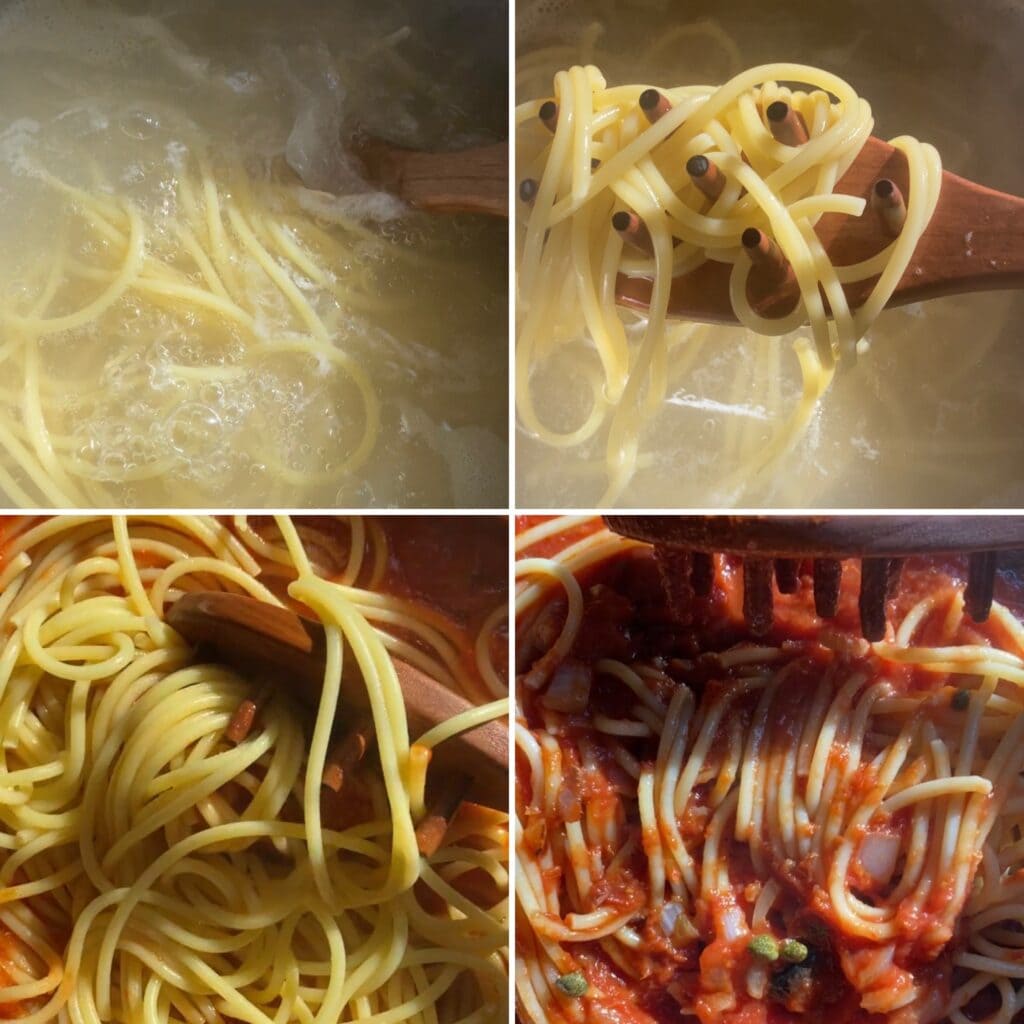
How do you cook Spaghetti without it sticking?
Are you guilty of adding olive oil or butter to prevent it from sticking? MYTH: Adding oil or butter to your pasta water stops it from sticking. This does more harm than good for your final pasta dish.
Tips for making pasta without it sticking:
- Add the pasta AFTER it is at a rolling boil. It will start moving instead of falling and sticking to the bottom.
- DO NOT DUMP and DASH. This will create a clumpy mess and cause the pasta to stick to the bottom of the pan! Stir the pasta often while cooking.
- Use the correct pasta tool with fork-like prongs to separate the pasta (see below)
- OIL AND WATER ARE NOT FRIENDS. If you add fat to the water it will prevent the pasta from absorbing the sauce once combined.
I get it! You are busy! The sauce is still cooking, but your pasta is done! You let it sit, or worse add oil to coat it BEFORE mixing WITH the sauce. If you have to pick one: let the sauce sit rather than the drained pasta!! If you’re making a pasta salad, check this recipe post to know how long pasta salads last and how to store them properly.
Equipment
How long should you boil pasta?
Look at the box and plan before preparing the meal. It’s a good idea to check after four minutes because the size will vary a bit from pasta shape to quality. Depending on the thickness and type of pasta the boiling times will vary from about 7-14 minutes.
If making fresh pasta, you will only need to boil for a minute or two, sometimes three.
Cooking Pasta ‘al dente’
As an Italian we always say, “cook your pasta ‘al dente'”, but WHAT does that mean, WHY does it matter, and HOW do you cook it? Follow these tips for the perfect al dente pasta every time!
What does ‘al dente” mean?
‘Al dente’ means to the tooth or with a slight bite. Here is an example of a lasagna pasta that is cooked al dente:
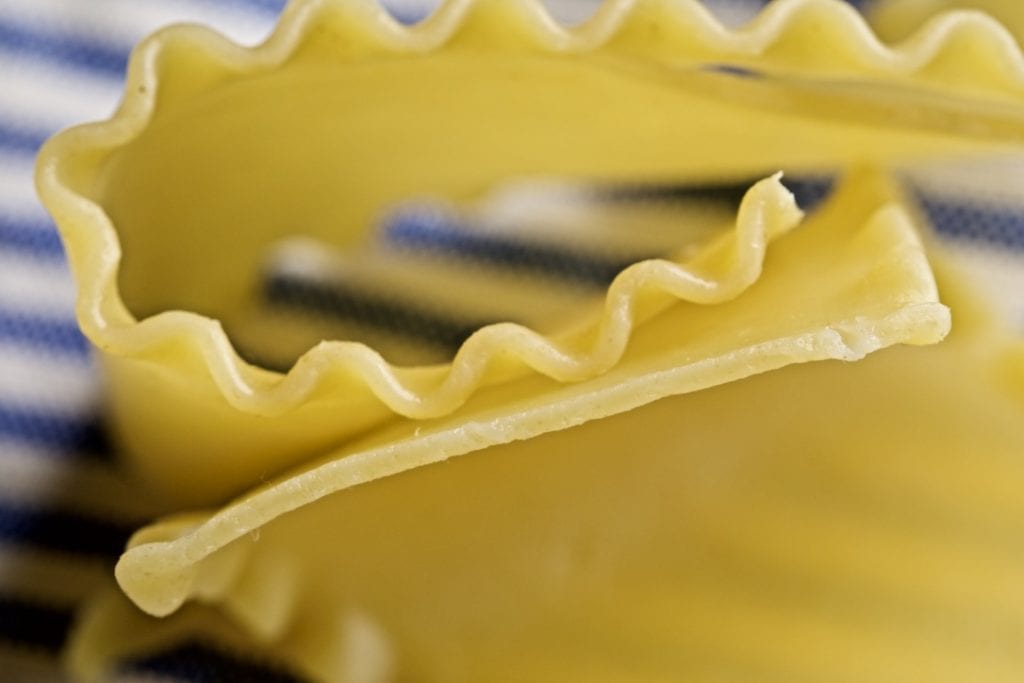
See more : How To Put Out a Fire in a Fireplace
Make Classic Italian Lasagna Bolognese with Bechamel Sauce for your next special meal!
WHY cook pasta al dente?
Pasta is healthier al dente! If overcooked, the GI index will rise, meaning pasta that is cooked al dente is digested and absorbed slower than overcooked mushy pasta. It also just tastes better :). Try it this way when making Shrimp Scampi Pasta Recipe.
HOW long to cook pasta al dente
Use a large pot of heavily salted water (never add oil), measure your quantity, stir, and set a timer- typically 2-3 minutes before package directions.
Make sure to TASTE test the pasta at the end of the cooking time to make sure it’s properly al dente! You may need a few extra minutes, or it may be done before expected. Mangia! (Eat!)
Why taste testing pasta matters
Do you cook and drain without tasting? It’s essential to taste your pasta before draining it to make sure it is the proper texture. How else do you know it’s truly done- ‘al dente’?
How to properly taste test pasta:
- Start tasting the pasta at 20-second intervals, from a minute or two before you think the pasta might be ready. I usually test twice.
- The pasta will also continue cooking if added to a hot sauce. Add it to the sauce and let it finish cooking for a minute or two until it is al dente. Taste again for flavor and Mangia! (eat!)
What stove setting for pasta?
To get the water boiling you will want to start on high heat to get it to a boil in the fastest time (unless you want to delay the boil).
When you add the pasta to the pot it will stop the heat and take a moment for it to come back to a boil. After it comes back to a boil, lower heat to medium or medium-high, so your pot isn’t boiling over as the pasta cooks.
Remember the movement of the water also helps the pasta move and cook evenly.
Entertaining Tip: when I am hosting and I am making pasta I typically bring the water to a boil, cover it with a lid, then turn it to a low simmer. I keep the water warm so I can bring it to a faster boil right when I need to add the pasta.
How much water do you use to boil Spaghetti?
If you are making Spaghetti you need 4 quarts of water. I generally use this much for other pasta types as well if I am making 1 pound of pasta. You can adjust this ratio depending on how much you are pasta you are making.
Pasta cooks best if there is enough water in a large pot that it can swim around and feel ‘free’. This also helps the pasta cook evenly.
Quick and easy Spaghetti with Authentic Italian Amatriciana Sauce recipe.
Why you should save your pasta water
When you cook pasta and serve it with a sauce make sure to save that starchy cooking water!!Reasons to reserve your pasta water:
- Pasta water is liquid gold and the secret to making perfect sauces like Authentic Cacio e Pepe Recipe (Best Tips) and Authentic Pasta Carbonara Recipe NO Cream.
- Sometimes sauces like meat-packed Bolognese need a little thinning out after simmering for hours, and pasta water helps loosen and flavor it without sacrificing texture.
- Creamy carbonara sauce cools quickly; the addition of pasta water will rescue it from clumping.
- The starch in the water helps the sauce adhere to your pasta and create an even more tasty sauce.
- How much do you save? I usually reserve a half cup to one cup and add it accordingly.
Try this method and let me know what you think!
How much Spaghetti should I cook per person?
Do you DUMP or MEASURE your pasta? It’s easy to over/under estimate how much Spaghetti or pasta you really need.
Instead of dumping in a random amount and having way too much or not enough, take a minute to measure portions.
Once you measure a few times you will get in the habit and remember how much you need per number of people.
Tips for Measuring Pasta
- Use a kitchen scale to weigh out servings. Servings vary from person to person. —anywhere from 56 grams- 200 grams of dry pasta per person.
- For small shapes (like elbow macaroni or shells), you can measure about 1 heaping cup of dry pasta per person
- You can also use a soup ladle for a rough measure– about 1 ladle per person (my mamma does this).
- For long pasta (like Spaghetti, angel hair, or thin Spaghetti) use my pasta measuring tool, or something similar.
I don’t store leftover PLAIN (unseasoned) pasta in my fridge. I usually make double my sauces and save the sauce. Then, all I have to do is cook my pasta for a fresh meal!
See more : Indulge in the Savory Delights of Chefwaynes-bigmamou’s Taco Bell Taco Salad
Here are some delicious sauces I like to make and freeze and always have on hand: Classic Italian Tomato Sauce (Sugo al Pomodoro), Authentic Italian Pesto Genovese (Basil Pesto), BEST Italian Beef Short Rib Ragu, Classic Italian Ragu Recipe (Meat Sauce), and even Nonna’s Famous Traditional Italian Meatballs (Polpette).
Should you rinse pasta?
If you are an Italian the answer to this will always be NO! When you rinse your pasta you are rinsing liquid GOLD!
Why you should NEVER EVER (I mean never) rinse your Italian pasta (one exception is gluten-free pasta):
- The starch in the water helps the sauce adhere to your pasta and create an even more tasty sauce.
- Rinsing pasta will cool it and prevent the absorption of your sauce. Instead:
- Toss hot and drained pasta in a warmed saucepan with your prepared sauce. The heat of the starchy pasta will grab the sauce and do a happy dance!
You might also love this pasta sauce – Marinara Sauce Recipe!
Should you rinse pasta for cold pasta salad?
Despite the popular belief, even by many chefs, that you need to rinse your pasta under cold water for a cold dish- my answer is still no.
Are you rinsing pasta even for cold pasta salad? Here is why you DO NOT NEED TO DO THIS:
Rinsing strips the starches from the pasta. In the end, this does more harm than good for the overall taste and texture of the dish.WHAT TO DO INSTEAD…
- Cook pasta al dente and drain.
- STILL, toss hot pasta with the desired dressing /sauce/vinaigrette so it will absorb the delicious flavors right away.
- THEN, allow it to cool a bit before adding the fresh ingredients!
- Add a little more of the dressing and toss. More flavorful!
TRY IT. Pasta salad game changer! This may method is not considered the popular way, but it is the best way!
Here are a few pasta salad favorites: Easy Italian Tortellini Pasta Salad, Easy Italian Style Pasta Salad with Arugula, and Greek Style Pasta Salad.
How to properly salt your pasta water
How much salt for pasta water? We say, “salt your pasta water like the sea”, but what does that mean exactly?
TIPS: 🔸1:2:4🔸
- In general, 1 pound of pasta: 2 tablespoons of salt: 4 quarts of water (equal to 1 gallon). *as always- adjust to your taste!
- Remember, you want your pasta to taste seasoned before adding any sauce. Salting the water helps achieve this.
- Cooking the pasta in salty water allows it to absorb some of the salt as it cooks, enhancing its flavor from the inside out.
- If you only season pasta after it is cooked it will only season the surface of the pasta.
- Taste before draining and you can always add a bit more if needed. The pasta will still absorb it. No bland pasta here! – If you have heart issues or are on a low sodium diet these tips do not apply to you.
When to salt pasta water?
The BIG debate- not IF but WHEN you should salt your pasta water. Here are a few rules to follow:
When to salt pasta water:
- Add the salt when the water comes to a boil, or near a boil, is my preference.
- The boiling water will agitate and dissolve the salt quickly.
- If you add salt before it boils most of it will stay at the bottom of the pan and actually damage your pan over time.
- Adding the salt before the water boils also makes the water take longer to boil because of the chemical effect that occurs.
- Wait until the water returns to a full, rolling boil before putting in the pasta.
Rescue method: What is you forget the salt and don’t realize until you taste test the pasta? Don’t worry I’ve done this! The pasta will still absorb salt even in the last 30 seconds of cooking. Hurry and add your salt and stir vigorously right before draining it.
Do you cover pasta while boiling?
If you are asking an Italian- no! You need the water to be at a gentle boil while the pasta is cooking. It is okay to cover the pot while you are trying to get the water to boil, but not after the pasta is added.
If you cover the pasta with a lid while it is cooking it will not cook as well, since you will need to lower the heat enough so the water won’t boil or bubble over the pot.
FAQ and Summary
Popular Pasta Recipes you will love:
- Easy Creamy Saffron Sauce with Pasta
- Pappardelle Pasta with Creamy Mushroom Sauce
- Shredded Zucchini and Cheese Pasta (easy)
- Brown Butter Basil Pasta Recipe
- Eggplant and Tomato Pasta Sauce
I hope you found this article helpful! Share with your family and friends. Now, you can cook dry pasta perfectly every single time!
Make sure to follow me on Instagram @cucinabyelena for more. To get more ideas follow me on Pinterest.
This post contains affiliate Amazon links.
Nigel Gildon editor:Nigel Gildon is the editor of Chef Wayne’s Big Mamou: Chef Wayne’s Big Mamou. He has worked in the publishing industry for many years and has a passion for helping new authors get their work into the hands of readers. 63 Liberty Street * Springfield, MA 01003





